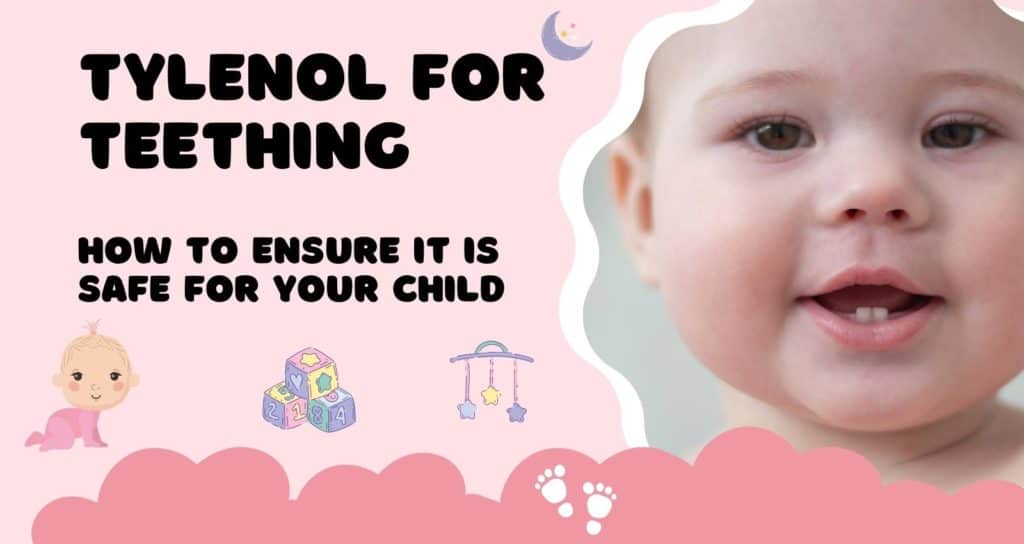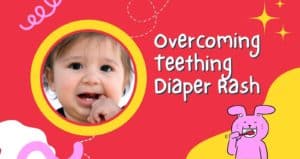Baby Tooth Chart – Timelines & All you need to know
Medically Reviewed by: Dr. Kedar Patnekar (MBBS, D.N.B, D.C.H, Specialist Pediatrician) Dubai, UAE.
-
Author: Amar Kirale
- >> Post Created: June 2, 2022
- >> Last Updated: April 19, 2024

Tylenol for teething - Table of Contents
Teething can be a really painful period for some babies and merely using home remedies like a chilled teething toy or a wet washcloth to gnaw on may not work in combating the pain. That’s when you really need to turn to medicinal relief for your baby, and Tylenol is said to be one of the most recommended medicines for such times!
Nevertheless, how much of it is really safe for babies and for how long? This article aims to discuss the extent of teething pain that calls for Tylenol, the recommended dosages and durations. We have also tried to explore other options, if any.
How bad is teething pain?
Of course, you don’t remember it from the time you were a baby. But if any of you have had a wisdom tooth trying to make its way out in the last few years, then try to recall the agony. Now imagine a baby going through this pain again and again till all the teeth pop out.
Teething pain may not be described exactly as the pain we feel in the usual way. Experts like to explain it as a ‘dull, achy sensation’ which could also be itchy, rationalizing the act of babies wanting to chew and bite continuously during teething.
The experience of teething pain may differ from baby to baby; some may hardly feel the pain, while some may find it unbearable! But one thing is sure, your baby will feel something different in their mouth and they are not going to like the change till it all settles.
So it is always best to be prepared for the teething phase of your baby – armed with knowledge, teething toys, and medicines (if & when required).
Identifying teething pain in babies
Ascertaining the exact problem with a baby is difficult as they can’t tell you themselves. But nature has its way and certain symptoms in babies clearly point out that all is not well with your baby.
- Crankiness, irritability
- Extreme clinginess, as in wants to be held all the time
- Difficulty in sleeping
- Pulling on their ears
In case your baby is experiencing teething pain, there will be added symptoms like –
- Excessive drooling
- Urge to bite and gnaw on anything and everything within reach
- Swollen gums
- Warm body (not fever, just slightly raised temperature)
Click here for detailed signs and symptoms of teething.
Note: If your baby is running a fever, then immediately take them to your doctor, as teething will never cause fever, just slightly higher temperature. The fever means the baby has some other issue, which needs a doctor’s attention.
When to use Tylenol for teething?
Tylenol is a common name in children’s medicines, given for pain and fever.
However, if your baby is under 2 years of age, then even the manufacturers of the medicine recommend talking to your doctor before giving Tylenol for teething.
Teething generally begins between 4 to 6 months of age and doctors do recommend it, but the dosage varies.
Some moms vouch by Tylenol for teething and a few doctors also suggest Tylenol for teething randomly in case of too much pain.
However, there are certain recommendations regarding Tylenol that you should be aware of before you give it to your child.
- All pediatric Tylenol medication – liquid or tablets – now hold the same strength per dose – 160 milligrams. In liquid form, this equals to 5 milliliters (mL).
- For a baby who weighs between 6 and 11 pounds, the ideal dosage is 1.25 mL, according to experts. For every 5 pounds added to this weight, the dosage increases by about another 1.25 mL.
- If the need arises, you can give your baby a fresh dose every 4-6 hours, but do NOT give more than 5 doses in 24 hours.
- It is suggested to give Tylenol to your baby before they go for a long nap, probably an hour before it is bedtime.
- Liquid Tylenol can be given to children of any age. However, if your child is up for it, then you can also give them chewable or dissolvable tablets.
- Always use the measuring instrument provided with Tylenol packaging, to give the exact dosage to your baby.
So while giving Tylenol or any other pain medication for teething, you should ensure that you understand the above points and adhere to the safety instructions listed below.
Motrin Vs. Tylenol for teething
Motrin is another medicine for babies over 6 months of age suffering from teething pain.
However, if you compare – Motrin Vs. Tylenol for teething, then like other parents our first preference has always been Tylenol as it is safe for smaller babies as well.
Tylenol and Motrin – both are as effective when it comes to relieving teething pain; it just all comes down to the baby’s age, tolerance, and responsiveness to the medicine.
Read this next
How safe is Tylenol (Acetaminophen) for children?
Tylenol’s generic name is Acetaminophen and it is used to treat fever and mild to moderate pain. So whether you use Tylenol for teething/ Tylenol for teething baby at night or whatever is prescribed by the doctor is absolutely safe when –
- Given in the appropriate dosages (according to weight & age)
- Given at the right intervals of time
If any of these are missed, then Tylenol can be the cause of liver damage or even liver failure.
If your child is taking any other medication, when you start giving them Tylenol as well, make sure that the other medications do not contain Acetaminophen, as it can cause an over dosage. Administering the medicine at appropriate intervals is also necessary.
Many cough & cold medicines contain Tylenol; for example –
- Benadryl Allergy and Cold Tablets (325 mg)
- Sudafed PE Nighttime Maximum Strength Tablets (325 mg)
- Theraflu Nighttime Severe Cold and Cough Powder (650 mg)
- Tylenol Plus Children’s Cold and Allergy Suspension
- Tylenol Sore Throat Nighttime Liquid
- Tylenol Chest Congestion Liquid
NOTE: Several of these medicines mention Acetaminophen as ‘APAP’ in their content list, which many parents might not be able to identify. So please be alert and aware of the content before administering more than one medicine to your child.
Acetaminophen overdose cases causing liver damage are also seen in adults. In fact, a recent study conducted by Larson & colleagues found that “Tylenol toxicity was the leading cause of acute liver failure in adults in the United States.” Of the studied 662 adults with acute liver failure, 42% of the cases were caused by Acetaminophen overdose.
We still say Tylenol is safe and very useful when no home remedies work for teething pain. But we do emphasize on the importance of the right amount of dosage and time intervals between two dosages. Hence most parents around the world are very comfortable and vouch for Tylenol for teething baby at night and even during the day.
Tylenol, with the 160mg/5mL strength and dosages based on the weight of the child is generally safe for babies. However, if you want to be doubly safe about it, talk to your doctor about dosage recommendations.
Natural remedies for teething
Many have sworn by the effectiveness of these home remedies for teething.
- Teething toys
- Chilled, frozen fruits or vegetables to gnaw on
- A cooled washcloth to chew on
- Massaging sore gums with your clean fingers
- Using toys to stimulate other senses for distraction
- Absorbent bibs to protect clothes and skin from excessive drool
Click here for more home remedies.
Among teething products, however, avoid the following –
- Topical teething gel: As it gets washed away with the excessive drool. Can also numb the baby’s throat, making it difficult to swallow food or water.
- Amber teething necklaces: Most teething jewelry have small pieces strung together, which can pose a choking It can also be a strangulation hazard.
- Some homeopathic medication for teething pain may contain Belladonna which is not safe for kids.
When to talk to a Pediatrician
The teething phase might seem like a daunting time for a new parent, but it can be easily managed with a combination of natural remedies and over-the-counter medications (if required) after consulting your doctor for the appropriate dosage.
However, you should also talk to your pediatrician if –
- You are stressed and having a hard time managing your child during the teething phase
- Want to help your baby with the pain and discomfort, but do not know what to do
- You feel your baby needs Tylenol repeatedly for pain relief
There can be a good chance that something else besides teething is bothering your baby. Therefore, if your baby is inconsolable and you do not understand why, see your pediatrician!
Safety tips while using Tylenol

Medicines – for children or adults – need to be administered in the right way to really be benefitted of it. If this is ignored, there’s no saying to what extent the harm can be. Always remember –
- Always read the list of ingredients and its levels when buying any over-the-counter medicine. It might seem boring or confusing, but knowledge here can save you and your loved ones in a big way. Talk to your doctor to identify the right kind of treatment your child needs.
- Tylenol for teething is safe when given in right dosages and time intervals, but we suggest do not go for it unless extremely necessary.
Teething is a natural phenomenon and though it does cause a lot of inconvenience to the baby and parents, it will keep re-occurring till your child is around 2 years of age.
Calming the child with Tylenol every time may not be feasible. Talk to your doctor if you have any doubts.
- If you have to administer Tylenol to your child, then make sure you get a table (from a pharmacist or your pediatrician) correlating the baby’s weight with the correct dosage.
- Tylenol is an effective medicine for fever as well. When the fever is high (if viral, infection happens at end of the day or middle of the night), especially in children prone to febrile seizures, it needs to be treated immediately.
- If your child complains of body ache or headache, with or without fever, they need medical attention.
- Do not worry much with minor colds and low-grade fever.
- Understand that colds are viruses and do not have a definitive treatment; medicines for a cold only suppress the symptoms, which anyway last only for a few days. Therefore, try clam the symptoms without using medicines, unless really required.
- If your child is unable to sleep at night because of the pain, then a dosage before bedtime will help. Good sleep is extremely necessary for babies and adults to recover and stay healthy.
- Some parents might alternate between Tylenol and Ibuprofen, but understand that it does not treat fever or pain in a better way. But it helps you avoid unintended overdosing of either one of the medications.
- If your baby does not show any improvement even after medications or they need continuous attention for fever or pain or irritability, then we suggest you show them to your pediatrician.
Note:
Keep a gap of 4-6 hours between two doses of Tylenol
Keep a gap of 6-8 hours between two doses of Ibuprofen
Tylenol Liquid | Tylenol Infant Drops |
For children | For smaller kids |
Less concentrated (5 ml contains 160 mg of Acetaminophen) | More concentrated (0.8 ml contain 80 mg of Acetaminophen) |
*Always refer to a table for the levels of content in medications before giving kids
Key Takeaway
Tylenol for teething can be very effective, provided you are careful about the amount of dose and intervals between two doses.
However, we suggest use it only when really necessary. Also, if your baby is on any other medication as well, make sure your doctor knows about it so that the combination of medicines does not cause an overdose or a conflict.
When it comes to medicines, awareness and knowledge is the key to make the most from it. Never shy away from asking your doctor to know more about the medicines you administer your kid.
Hope this article has given you a perspective on all you need to understand & know about using Tylenol for teething pains. Do let us know your experiences and also let us know if you have more home remedies that you have tried which worked for teething.
Teething is a phase and will pass. You have done great so far and will further do amazingly well with your child.
Happy parenting!













It’s best to participate in a contest for among the best blogs on the web. I’ll recommend this web site!
Great write-up, I’m normal a regularly visit this blog, you have maintained it well.
And I am sure its gonna be famous very soon.
Very informative post; its very well written. I also liked home remedies that you have suggested in other posts.
Keep up the good work.
Thanks Frida for visiting.
I am glad you found the info you were looking for on our blog.